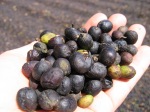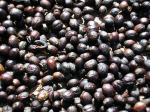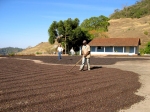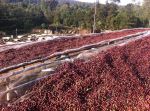Natural Processed Coffee
This week we’ve been roasting our first ever Cup of Excellence coffee, Fazenda do Brejinho, a natural processed coffee from Brazil. We’ve used a number of natural coffees in the past five years, from Brazil, Central America and Africa and I have to admit I’m quite partial to coffees processed in this way. On a number of occasions, however, these types of coffees have divided opinions.
‘Processing’ is the term given to the method used to remove the coffee bean from the coffee cherry. There are three main methods, though there are many variations in each case. The natural method of processing has been around for thousands of years and involves allowing the coffee cherries to dry in the sun with the beans still inside. Once fully dried the beans are removed by dry milling. During the drying process the cherries impart fruity flavours onto the beans, and the resulting coffee is often much sweeter than coffess processed by other methods. A simple analogy is that of red wine where the skin is left on, imparting different qualities to the finished wine. This analogy is explored in this article, which also discusses natural processing in more depth.






A disadvantage of this method of processing is that the cherries will ferment during the drying process and this can add a negative flavour to the coffee itself. Many of the coffees we’ve tried over the past few years have exhibited a fermented characteristic to a certain degree. This is often most obvious in the fragrance of the green beans – think boozy, fermented, grass-like tones. Natural coffees also have a lot of sweetness, fruity flavours and often have a thick mouthfeel.
We were really excited to try Fazenda do Brejinho as, having been through a thorough examination in the Cup of Excellence competition, it was likely to be a very good example of what can be achieved by this processing method. We were initially struck by the fragrance of the green beans: less boozy, fermented tones this time. In the cup the fruitiness was much more balanced than other natural coffees we’ve experienced. We picked out hints of cranberry and orange when the coffee was warm, both flavours more evident in the finish. As the coffee cooled a hazelnut flavour became much more apparent. The thick mouthfeel and sweetness reminded us of a chunk of nougat. We always enjoy coffees which change in character as they cool, and this one was no exception.
If we’ve whetted your apetite, we have a few more bags of this coffee left. It was a very limited release and the majority was snapped up straight away. You can buy a bag by clicking below: